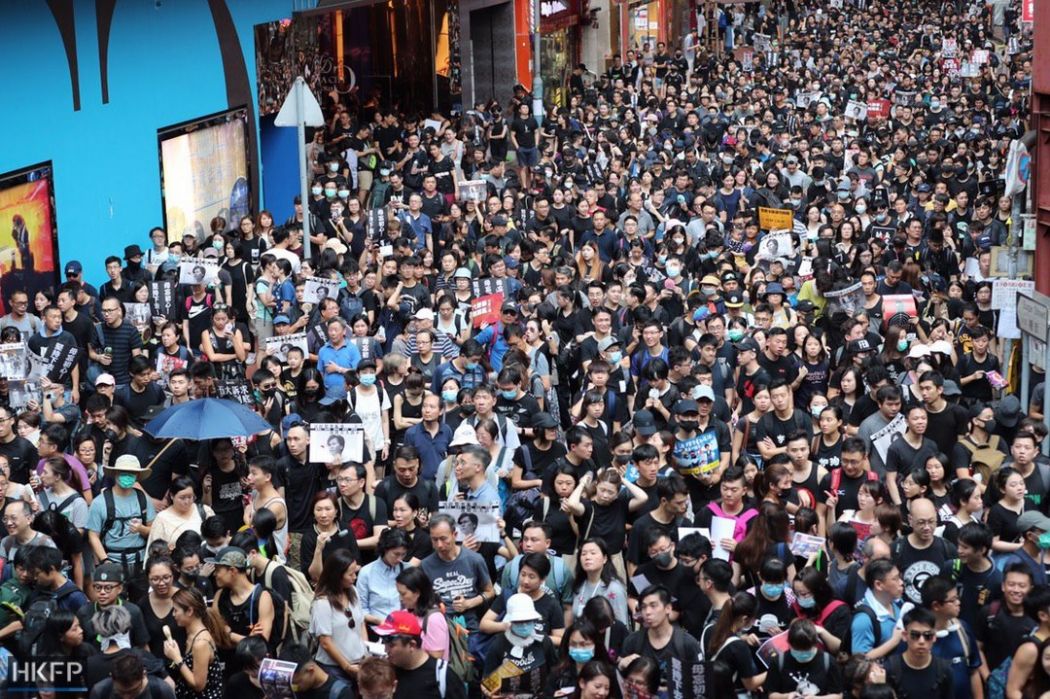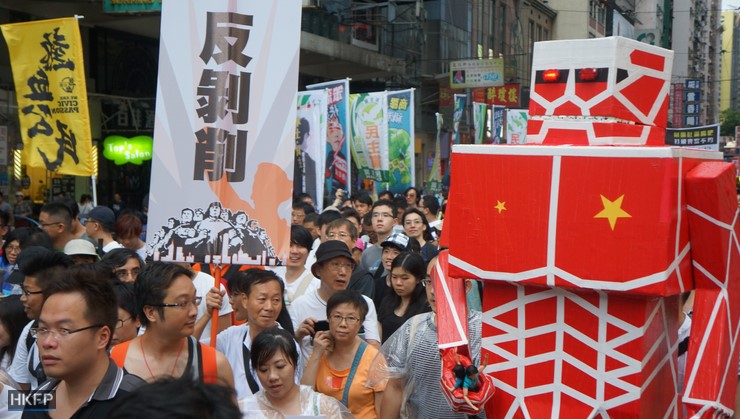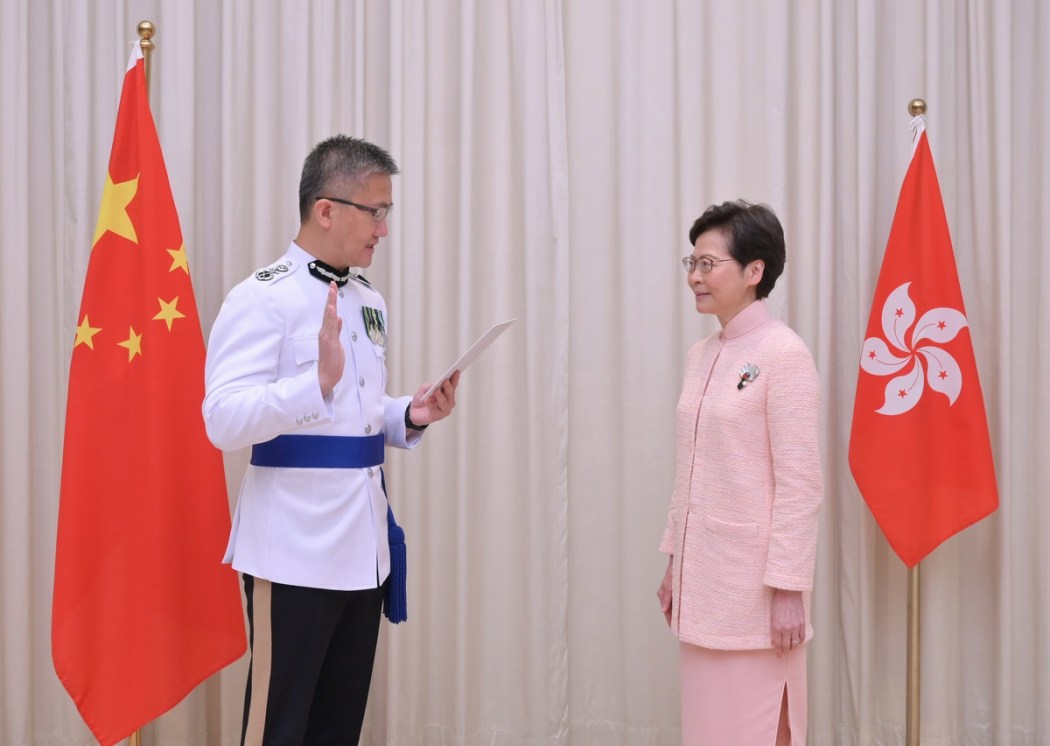The protest coalition which has organised some of the biggest pro-democracy demonstrations in Hong Kong’s history has disbanded following pressure from the authorities.
The Civil Human Rights Front (CHRF) said in a statement on Sunday that it decided to disband on Friday, just three days after Hong Kong’s largest teachers’ union announced it would fold.

“In the course of over a year, the government continuously used the pandemic as a reason to reject the demonstration applications of CHRF and other groups – each member group was oppressed, and civil society was facing unprecedented challenges,” its statement said.
The CHRF was founded in 2002 to coordinate protests by a network of pro-democracy and social issue advocacy groups in the city. After holding its first, record-breaking rally in December that year against Article 23 of the Basic Law, the coalition became chief organiser of the city’s annual July 1 protests until the event was banned by the police for the first time last year, ostensibly over Covid-19 concerns.
“CHRF originally hoped to continue to face the challenge with everyone in the existing ways, but convenor Figo Chan is already in jail because of several cases, and the secretariat can no longer maintain its operations. With no members participating in the next secretariat, we can only begrudgingly announce our disbandment,” the statement said.
The coalition added that the decision to shutter was unanimous and around HK$1.6 million worth of assets will be donated to “appropriate groups.”
“Even though CHRF no longer exists today, we believe that different organisations will still keep their beliefs, not forget about their original intentions, and support civil society.”
Embattled coalition
The CHRF – which espoused non-violence – had faced increasing scrutiny from the government and pro-Beijing camp since the 2019 anti-extradition bill protests.
While it always sought police approval when planning demonstrations, and has never held protests that did not receive a police-issued “letter of no objection,” it was accused of being responsible for violent clashes between protesters and police after several, approved 2019 demonstrations had ended.

The group – which was able to mobilise over a million demonstrators by some estimates – also saw its leaders remanded in custody or imprisoned. Its convenor Figo Chan was jailed for 18 months over a banned protest on China National Day in 2019.
The front did not organise this year’s protest on the 24th anniversary of Hong Kong’s Handover, citing administrative difficulties and the city’s political environment.
The CHRF also saw a number of its member groups quitting after the Chinese-language Singaporean newspaper, Lianhe Zhaobao, reported in March that the group was the subject of a national security investigation.
Among those who have left since were the Democratic Party, the Civic Party, and the now-defunct Hong Kong Professional Teachers’ Union.
The coalition had around eight remaining members at the time of its Friday meeting, including the organiser of the annual Tiananmen Massacre vigil, the Hong Kong Alliance, League of Social Democrats, and the Hong Kong Confederation of Trade Unions.
Rights ‘no longer be taken for granted’
Chung Chung-fai – former-temporary convenor of the front – told HKFP on Sunday that he had no further comment and that there would be no press conference.
However, in a statement, Joshua Rosenzweig of NGO Amnesty International decried the “accelerating disappearance of independent civil society groups” from the city.

“Days after Hong Kong lost its biggest teachers’ union, the city’s leading civil society voice has also been forced out – disbanding in the face of a long-running campaign to discredit and disable it through a combination of harassment by police and pro-Beijing media… The Hong Kong authorities’ assault on human rights has ramped up with these attacks. Along with political parties, media outlets and unions, we sadly now must add NGOs to the list of those targeted simply for doing their legitimate work.”
“The CHRF has organized, often in close collaboration with the police, large-scale peaceful rallies in Hong Kong for 20 years without being accused of breaking any law. Its demise is yet more evidence that Hongkongers’ rights to freedom of association, expression and peaceful assembly can no longer be taken for granted under the authorities’ obsession with ‘national security.’”
A statement from the largest pro-Beijing party, the DAB, said it supported further law enforcement action against CHRF following its disbandment: “It’s difficult to detail all of CHRF’s crimes… We stress that any group or their organiser cannot write off their illegal actions with dissolution and escape from their legal responsibilities.”
Security law action
In an interview with a state-backed newspaper published on Thursday, police chief Raymond Siu said that the force “was ready to take action at anytime,” and that CHRF might have violated the national security law for “organising a series of large-scale, illegal protests” in recent years.
It is despite the fact that the coalition has not organised any rallies since the security law was enacted last June 30. Chief Executive Carrie Lam told the UN last June that the law would “have no retrospective effect.”

Siu told Ta Kung Pao said that, while some of the leaders of the organisation were already jailed over illegal assembly charges, he “would not rule out that the police will continue to investigate and prosecute” core members of CHRF.
“If any organisations or anyone was breaking the law, we won’t wait until this moment to look at evidence or take action, we will already have gathered relevant evidence,” said Siu. “So if anyone is violating the law, don’t think that you can get away with it.”
In April, the police requested that the organisation explain why it did not re-register as a society under the Societies Ordinance, after CHRF cancelled its registration in 2006.
The front was also asked to submit information related to its operations, including a list of protests and rallies it had held since September 2006, its sources of income and expenditure, as well as the bank account it used for receiving funding.

The protest coalition refused to comply with the police’s request in May, and said in a letter to the police that “government departments including the police have worked with CHRF, they have never requested CHRF to register as a society, and have never warned or questioned that the CHRF was an illegal group.”
“During a hearing before the Appeal Board on Public Meetings and Processions, police representatives even complimented CHRF as ‘a big brand’ which ‘cooperated very well’ with the force over marches and assemblies,” the letter read.
Additional reporting: Tom Grundy and Selina Cheng.
Support HKFP | Policies & Ethics | Error/typo? | Contact Us | Newsletter | Transparency & Annual Report | Apps
Help safeguard press freedom & keep HKFP free for all readers by supporting our team

HKFP has an impartial stance, transparent funding, and balanced coverage guided by an Ethics Code and Corrections Policy.
Support press freedom & help us surpass 1,000 monthly Patrons: 100% independent, governed by an ethics code & not-for-profit.










